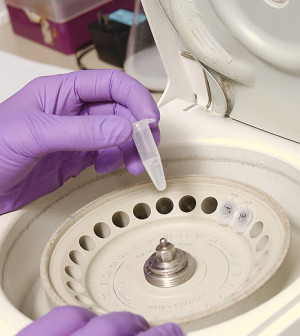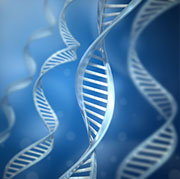- 8 Ways to Increase Dopamine Naturally
- 7 Best Breads for Maintaining Stable Blood Sugar
- Gelatin vs. Collagen: Which is Best for Skin, Nails, and Joints?
- The Long-Term Effects of Daily Turmeric Supplements on Liver Health
- Could Your Grocery Store Meat Be Causing Recurring UTIs?
- Are You Making This Expensive Thermostat Error This Winter?
- Recognizing the Signs of Hypothyroidism
- 10 Strategies to Overcome Insomnia
- Could Artificial Sweeteners Be Aging the Brain Faster?
- Techniques for Soothing Your Nervous System
Gene Exam Might Predict Breast Cancer Progression


Predicting whether early stage breast cancer will become invasive and lethal remains a challenge for doctors. But new research suggests that a panel of 55 genes might help guide medical odds-makers.
Women who had genetic alterations in this panel were less likely to survive breast cancer over nearly two decades of follow-up than those without any changes, said study researcher Susette Mueller, professor emeritus of oncology at Georgetown University’s Lombardi Comprehensive Cancer Center in Washington, D.C.
“If people had changes in any of the 55 genes, they had worse outcomes,” she said.
Researchers studying this panel focused on the loss of a powerful tumor suppressor gene known as SYK. When a copy of SYK is lost, 51 other genes are directly affected. This leads to genetic disruption, according to the authors of the study, published online Feb. 11 in PLOS ONE.
The gene screen is far from ready for use in everyday practice, Mueller noted. But it’s hoped that more research will show it’s a reliable tool, one that might guide doctors making treatment decisions.
“When women have ductal carcinoma in situ (DCIS), it’s carcinoma but not invasive,” Mueller said. “A small number of them go on to have invasive cancer.”
But there is no accurate way to determine which ones will progress and which won’t.
How abnormalities in genes might trigger a cancer, predict its progression and help determine the best treatment is the subject of numerous investigations.
For several years, experts have recognized SYK as an inhibitor of breast cancer cell growth and spread. SYK can be lost when a gene is “turned off,” Mueller said, or when genetic instability occurs because pieces of DNA are missing, for instance.
In the current study, funded by Georgetown Lombardi and the U.S. Public Health Service, Mueller examined tissue samples from 19 women diagnosed with breast cancer. Eight of the women had ductal carcinoma in situ — noninvasive cancer, she said. The others also had some cancer in adjacent tissue.
Samples that revealed a loss of SYK also had evidence of invasive cancer nearby, Mueller said. But none of the noninvasive cancer samples showed loss of SYK.
“This was the first time that a loss of a SYK gene was found in DCIS breast tissue,” Mueller said. Now, she said the team needed information to determine the significance of this finding.
For that, she turned to the U.S. National Institutes of Health’s Cancer Genome Atlas. This catalog details gene sequencing and gene mutations from cancer patients and provides survival information.
The researchers looked at data for nearly 700 patients, comparing genetic changes in tissue samples to the patients’ results. Survival was much higher for the invasive breast cancer patients who had no changes in the 55 genes.
At the end of the 18-year follow-up, “an estimated 80 percent of 696 patients, or 556, who didn’t have changes were alive,” Mueller said. Only about 20 percent of those 696, or 140, with genetic changes were still living. The researchers could only estimate survival, she said, as complete medical records on all the patients were not available.
One specialist welcomed the report. “This discovery may help us understand why some DCIS never changes and others transition into invasive cancers,” said Dr. Jeffrey Weitzel, chief of clinical cancer genetics at the City of Hope Comprehensive Cancer Center in Duarte, Calif., who was not involved in the study.
The researchers may have found a “marker of transition,” he said. However, he agreed that much more research is needed.
More information
To learn more about genetics and cancer, visit the American Cancer Society.
Source: HealthDay
Copyright © 2026 HealthDay. All rights reserved.










